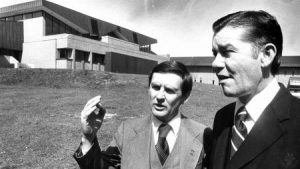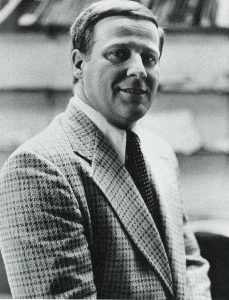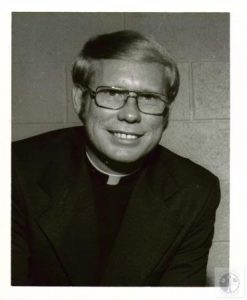By Dr. Raymond Hebert
Thomas More University
Part 14 of our series, “Retrospect and Vista II”: Thomas More College/University, 1971-2021.
The date was September 1, 1977 when a letter from Bishop Richard Ackerman of Covington announced that Thomas More College’s first lay president, Dr. Richard DeGraff, would be leaving Thomas More at the end of the 1977–1978 academic year.

President Robert Giroux. (Courtesy of Kenton County Public Library.)
The bishop stated that a search committee had been named to be chaired by Fr. William G. Brown, Rector of the diocese’s St. Pius X Seminary. R.L. Buse, Jr. from the Board of Trustees was named Vice Chairman, and Nancy Bruns from the History Faculty was to be the Secretary. Committee minutes over the ensuing months reflect the determination to bring in candidates: “with extensive financial experience, a social bearing, public speaking ability, good administrative judgement, the ability to lead and inspire, who is warm and personable, and can listen while recognizing limitations, and especially with charisma and fund-raising abilities” (TMU Archives).
The national search that followed brought in a wide variety of candidates. The committee seemed pleased with the responses and quality of the applicants as it recommended to the campus Dr. Robert Giroux, who was a Burlington, Vermont native. Most recently, Giroux had served as President and Chancellor of Clarke College of Dubuque, Iowa, a position he held from 1969 through 1977. Prior to that, he had held multiple positions, including Vice President for Academic Affairs and Director of Extension Services at St. Michael’s College in his native Vermont. Both St. Michael’s and Clarke were Catholic institutions, and while at both, he had shown great success in the writing of grants and fundraising, according to letters and interviews that emerged in the search process. On Tuesday, May 2, 1978, the Kentucky Post announced, “New Thomas More President Named.”

Richard DeGraff, Thomas More College’s outgoing president and Robert Giroux, TMC’s incoming president. (Courtesy of Kenton County Public Library)
The Committee was proud of the work it had done. It must have seemed to both the search committee and campus community that this was a match made in heaven when this good Catholic man, praised in letters as a “shaker and a mover” with an “innate ability to raise funds,” arrived in Northern Kentucky with his family. One of the glowing letters of reference had even come from the bishop of Providence, Rhode Island, who had grown up with Bob Giroux. He had described Dr. Giroux as “a model Catholic and family man [who] has always been devoted to the Church.” Among Giroux’s children (11 in all) were sons named Thomas More Giroux and John Fisher Giroux. Historically, Bishop John Fisher had been St. Thomas More’s closest friend and was the second religious leader executed by King Henry VIII for not supporting the king’s divorce.
Early in his presidency, Dr. Giroux (who was inaugurated at the “Thanksgiving Convocation” on November 20, 1978), emphasized to Cincinnati Enquirer reporter Cindy Schroeder (9/7/1979) that much of his early success was due to his commitment to the concept of “interdependence.” In his words, “interdependence is the only way to leadership…you have to be able to take advice as well as delegate authority.” The article related how a “team spirit” had become important at the college since, in the last years of Dr. DeGraff’s presidency, “there was a lack of continuity in the administrative staff.” The initial challenges for this new president also included a crucial and successful re-affirmation process in 1980 with the Southern Association of Colleges and Universities (SACS).

Nancy Bruns, Thomas More College History Department faculty member and secretary of the Presidential Search Committee. (Courtesy of Thomas More University Archives)
The same article also noted two important steps taken by the administration during the first year of the Giroux presidency. It was mentioned how “he cut $108,000 out of the budget and brought in a bequest of an estimated $250,000.” As he had promised to the Board of Trustees, he presented a balanced budget to them at the end of his first year. “It’s hair thin, but it’s balanced,” Giroux said.
Another important step for the future was Giroux’s commitment to the “implementation of a management information system.” In his words, “this is an important step for any organization, be it a newspaper, a business, or a college…in the future, when we need to know important bits of information from any sector of the school, we can draw it out of the computer.” Thomas More had entered the computer age.
One of the most interesting developments during the Giroux presidency was the inauguration of a 4-year BSN Program in Nursing, beginning in September 1978. There had been feasibility studies earlier in the 1970s and even letters in the files from President Murphy dating back to November 19, 1959 and February 10, 1967. A bit later, in the early 1970s, it was Dr. Ron Mann as Dean of the Faculty in a 1977 Program Proposal who concluded that: “Thomas More College is committed to facilitate the acquisition of a Bachelor of Science in Nursing (BSN) degree by diploma and associate degree registered nurses and is particularly anxious to serve the nursing educational needs of the Diocese of Covington” (Dr. Ron Mann “Nursing Program Proposal,” Fall 1977, TMU Archives).

Dr. Ron Mann, Dean of Faculty. (Courtesy of Thomas More University Archives)
With the support of President Giroux, the decision was made to begin the program in the 1978–1979 academic year. In an Enquirer story entitled: “Thomas More starting 4-Year Nursing Degree,” Bob Fogarty stated: “the first four-year program in Northern Kentucky leading to a Bachelor of Science in nursing was approved Friday by the state Board of Nursing for Thomas More College…the approval is a final step in gearing up for classes to begin in September, 1978.”
The first director of nursing, who began in the academic year 1977–78, was Virginia Harwood. An early disagreement developed about the nature of the program when the Kentucky Post noted in an article on January 10, 1979 that “the program would not welcome persons who hold an R.N. on the basis of studies elsewhere.” In a letter from the new Academic Dean, Sr. Mary Laurence Budde, SND, to Vance Trimble, editor of the Kentucky Post, this previous misstatement was corrected. In Sr. Laurence’s words: “it is the policy of Thomas More College to grant the greatest possible latitude to persons holding an R.N. who seek a BSN, within the limits imposed by state and national regulations” (Letter to Vance Trimble, January 11, 1979, TMU Archives). The Thomas More College Nursing Program was on its way. It has remained one of Thomas More College’s most successful pre-professional programs to this day.

Sr. Mary Laurence Budde, Biology faculty member and Academic Dean. (Courtesy of Thomas More University Archives)
Not long afterwards, in a surprising announcement in early 1981, while just in his third year as President, Dr. Giroux announced that he would be stepping down as the eighth president of Thomas More at the end of the year. Kentucky Post reporter Al Salvato interviewed Dr. Giroux, who stated that: “I was hired by Thomas More to help the financial position of the college. I’ve done that” and, later in the article, as he was moving on to a new challenge, “there will be a market for the next 15 years for people who can bail out colleges” (Al Salvato, “Work done, Giroux Quits College Job,” Kentucky Post, May 7, 1981). It is interesting that a later follow-up story in the Kentucky Post related how Giroux, then at Kansas Newman College in Wichita, Kansas, said that his new institution was also in debt. He told of using similar techniques as “suddenly everyone was turning to him to meet the crises.” Later in the article, Giroux talked about the need for studying the relationships between education and the high-technology industry” (Al Salvato, “Old Plight Follows College President,” Kentucky Post, August 10, 1983). Dr. Giroux had taken similar steps at Thomas More where he had been a strong supporter of the Cooperative Education Program and its Employer Advisory Board. Thomas More College seemed more ready than it had been for success after the Giroux presidency, even if it was for only three years.
With President Giroux’s departure, the college and its Board of Trustees looked internally, naming Theology faculty member Rev. Joseph Brink as Provost to lead the college on an interim basis in 1981–1982. Fr. Brink, in a year-opening letter dated July 14, 1981, spoke of a Dean’s Search Committee decision to name Biology faculty member Sr. M. Laurence Budde, SND, as the permanent Academic Dean. In his words: “After some consultation, thought, and prayer, I have asked Sr. Laurence to be our Dean…I’m sure Sister Laurence will do a great job, and with the cooperation of all of us, will be an excellent Dean” (Fr. Joseph Brink “Dean Colleague” letter of July 14, 1981, TMU Archives).

Fr. Joseph Brink, Theology faculty member and Provost. Courtesy of Kenton County Public Library.)
Fr. Brink also discussed faculty leaves, new department chair appointments, a college committee list for 1981–1982, a new administrative flow chart, and his concerns about the upcoming Fall 1981 semester freshman numbers. He asked all of the faculty to help with recruitment. He also noted how successful the College’s Friday Night Bingo, coordinated by the Athletic Boosters, had been.
In a fast-changing world of education, Thomas More College was entering the 1980s on the leading edge. It had a new nursing major, a respected co-op program, a firm Catholic identity for fairness and academic excellence, and a forward-thinking and dedicated faculty and staff. Its alumni were staunch supporters, as well. A new era of “legends”—faculty, staff and alumni with whom Thomas More became identified—was unfolding.
Dr. Raymond G. Hebert is a Professor of History and Executive Director of the William T. Robinson III Institute for Religious Liberty at Thomas More University. He has just completed his 46th year at Thomas More and, with that background, will now serve as the General Editor of the official history of Thomas More College/University from 1971-2021. With a projected title of RETROSPECT AND VISTA II, it will serve as the sequel to Sr. Irmina Saelinger’s RETROSPECT AND VISTA, the history of the first 50 years of Thomas More College (formerly Villa Madonna College). He can be contacted at hebertr@thomasmore.edu .
We want to learn more about the history of your business, church, school, or organization in our region (Cincinnati, Northern Kentucky, and along the Ohio River). If you would like to share your rich history with others, please contact the editor of “Our Rich History,” Paul A. Tenkotte, at tenkottep@nku.edu. Paul A. Tenkotte, PhD is Professor of History at Northern Kentucky University (NKU) and the author of many books and articles.
























